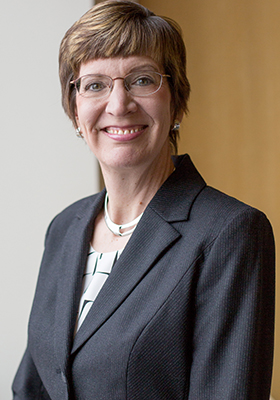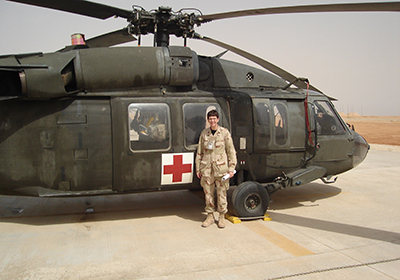

During her nearly 29-year Air Force career, Marla De Jong, PhD, RN, CCNS, FAAN, was at the forefront of many critical situations. Take 2006, for instance, when she was deployed to Baghdad, where she served as program manager for the Joint Theater Trauma System.
There, she used her research and leadership expertise, according to a Department of Defense report, “to manage data from 15 separate locations for 9,000 battlefield casualties… authored an intra-theater air transport guideline that improved safe MEDEVAC transport of critically injured casualties… These activities saved lives and limbs and improved trauma care throughout the joint combat theater of operations.”
Now, more than a decade later, as new dean of University of Utah’s College of Nursing, De Jong faces yet another set of distinct challenges, including keeping the college moving forward amid the COVID-19 pandemic.
Appointed dean effective August 17th, she came to U of U Health in 2017 as professor and chair of the Division of Acute and Chronic Care within the college. As dean, she now oversees the undergraduate and graduate programs of the college, with a focus on interdisciplinary teaching, research, clinical practice, and service.
"What an honor to educate the next generation of nurses, gerontologists, and scientists—and prepare our graduates to lead and contribute to transformative changes within health care."
A retired colonel, De Jong served in a series of clinical, leadership, research, and academic roles during her military career. She was associate dean for research and professor at the Daniel K. Inouye Graduate School of Nursing at the Uniformed Services University of the Health Sciences. She was also dean of the United States Air Force School of Aerospace Medicine; executive director of the TriService Nursing Research Program; the Air Force program manager for the Department of Defense Blast Injury Research Coordinating Office; and the Chief Military Consultant to the Air Force Surgeon General for Nursing Research.
In this Q&A, De Jong discusses her vision for the college, her efforts to promote wellness and diversity, how she is helping students and faculty cope with COVID-19, and how her military training helped prepare her for this new role.
What are you passionate about as dean?
I’m passionate about the College of Nursing’s mission to advance health through high-quality nursing and interdisciplinary teaching, research, clinical practice, and service. What an honor to educate the next generation of nurses, gerontologists, and scientists—and prepare our graduates to lead and contribute to transformative changes within health care.
In so many ways, the college is strong. Yet, I’m passionate about working with faculty and staff to envision the future, launch new initiatives, and improve processes, thereby moving us past the status quo to reach our highest potential.
I really enjoy leading. From day one, military officers are expected to lead, and I’ve led within military organizations that had disparate missions. I am known for my ability to rapidly embrace a new mission area, my foresight, and my ceaseless efforts to achieve quality in whatever the mission is for the organization. Now, in academia, I am eager to lead faculty and staff to accelerate breakthroughs in education, research, clinical practice, and community engagement that foster learning, improve patient access to quality care, and achieve best-possible outcomes.
What is your vision for the College of Nursing?
My goals are to prepare future nurses, gerontologists, and health care leaders to improve the health and care of individuals, families, and communities within our state and country; expand academic-practice partnerships within U of U Health; attain distinction in nurse-led interdisciplinary team science that is responsive to national and state needs; and implement strategies to recruit and retain diverse faculty, enroll and graduate diverse students, and cultivate an academic culture of belonging in which faculty, staff, and students of diverse backgrounds will thrive.
Perhaps, for instance, we could explore new care delivery models that extend our reach to medically underserved populations and ignite entrepreneurship, encouraging faculty and students to produce innovative solutions to challenges within health care. We might consider offering dual degrees—for example, nursing and architecture. This pairing could result in health care facilities that are designed to enhance human performance while improving comfort and safety for patients, families, clinicians, and staff.
How is the College of Nursing coping with COVID-19?
We’re being very flexible. In March, like everyone else, and under the strong leadership of interim dean Barbara Wilson, we shifted to virtual education. For the remainder of spring semester as well as summer semester, faculty delivered course content online, either synchronously or asynchronously, leveraging virtual simulation and telehealth to teach clinical skills. For instance, our psychiatric mental health nurse practitioner students and their preceptors used secure technology to care for patients in ways that were similar to in-person clinic appointments.
This was not quite so easy for our baccalaureate students, who normally complete many hours of clinical training in inpatient settings. But our forward-thinking faculty produced online demonstrations to teach clinical skills. The college purchased commercially produced virtual simulations that allowed students to assess a virtual patient, select nursing interventions, and re-evaluate based on feedback from the virtual patient and virtual preceptor. In addition, College of Nursing faculty held debriefing sessions with students.
This semester, students are delighted to be back in clinical settings. We are grateful for partners like U of U Health, Intermountain Healthcare, and the Veterans Affairs Salt Lake City Health Care System, which welcomed our students, enabling them to achieve full-spectrum experiential learning with patients. Of course, we ensure that students have access to personal protective equipment to keep them safe.
The pandemic has been a big stressor for all of us, particularly for those in health care professions. What role, if any, should the College of Nursing have in preparing its students for the stresses they’re going to be facing on the job?
Nursing is a physically and mentally demanding profession. For years, the focus was caring for others. You worked hard, you did what your patients needed, and you weren’t supposed to think too much about yourself or what you were feeling.
Today, we place much more emphasis on nurse wellness in our curriculum. Learning how to manage stress, eat properly, practice mindfulness, and attend to emotions can help our students be better prepared for the circumstances that they will face throughout their careers, whether they’re providing palliative care, caring for mothers during childbirth, comforting the friend of someone who took their life, aeromedically transporting a pediatric trauma patient, or caring for a patient after a successful heart transplant.
Nurses encounter difficult care situations, experience wide-ranging emotional reactions to practice, and face ethical dilemmas. It is vital that, early on, we teach nurses to practice self-care.
Nationally, there’s also been quite a bit of talk about diversity and inclusion in health care. What do you foresee happening at the College of Nursing along those lines?
I’m placing a big emphasis on diversity, equity, and inclusion. Regrettably, I acknowledge that systemic racism exists within the college and that our policies, processes, and actions are not always inclusive. That hinders us from being all that we can be. Clearly, we have work to do, and we will do it.
Within the College of Nursing, we have established task forces that are addressing topics like recruitment, retention, and promotion of faculty and staff, along with ways to better address racism, social determinants of health, social justice, and health equity within our curriculum. We’re implementing a holistic admission process for our graduate and doctoral programs and awarding scholarships to students from underrepresented groups. We’re working to ally with Black organizations such as the Black Cultural Center.
All these efforts are very important, and faculty, staff, and students are eager for us to move forward with this work.

How have you applied your experiences as an Air Force nurse to your new role as dean?
In the Air Force, I was expected to advance as a leader and nurse. Given expectations to be more of a generalist than a specialist, I was assigned to a new role or duty location every two to three years on average. Holding positions within community hospitals and medical centers, research organizations, and academia, I developed a broad range of skills, serving under many commanders and supervisors with differing priorities and leadership styles. These diverse experiences have helped me become a better, more knowledgeable, and confident leader.
Readiness is key to the Air Force achieving its mission. I was primed and ready on a moment’s notice to respond to whatever was required. For example, other Critical Care Air Transport Team members and I rapidly deployed to Washington, DC, on 9/11. Although I no longer have a mobility bag packed and ready for immediate departure, as dean I will be ready for the unexpected—whether a pandemic, hurricane-force windstorms in Utah, or other such disruptions—and lead the college through what’s needed to respond to the threat.
What is the best advice you’ve received about being a nurse leader?
Remember one’s core values, focus on today’s mission while creating a preferred future, know what is important to your boss, find the way to “yes,” and pursue excellence.